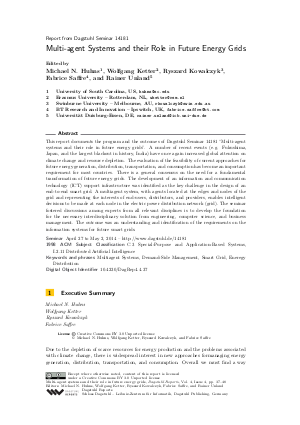Multi-agent systems and their role in future energy grids (Dagstuhl Seminar 14181)
Authors Michael N. Huhns, Wolfgang Ketter, Ryszard Kowalczyk, Fabrice Saffre, Rainer Unland and all authors of the abstracts in this report
-
Part of:
Issue:
Dagstuhl Reports, Volume 4, Issue 4
Part of: Volume: Dagstuhl Reports, Volume 4
Part of: Journal: Dagstuhl Reports (DagRep) - License:
 Creative Commons Attribution 3.0 Unported license
Creative Commons Attribution 3.0 Unported license
- Publication Date: 2014-08-27
File

PDF
DagRep.4.4.37.pdf
- Filesize: 0.96 MB
- 12 pages
Document Identifiers
Subject Classification
Keywords
- Multiagent Systems
- Demand-Side Management
- Smart Grid
- Eneregy Distribution
Metrics
- Access Statistics
-
Total Accesses (updated on a weekly basis)
0Document
0Metadata
Abstract
This report documents the program and the outcomes of Dagstuhl Seminar 14181 "Multi-agent systems and their role in future energy grids". A number of recent events (e.g. Fukushima, Japan, and the largest blackout in history, India) have once again increased global attention on climate change and resource depletion. The evaluation of the feasibility of current approaches for future energy generation, distribution, transportation, and consumption has become an important requirement for most countries. There is a general consensus on the need for a fundamental transformation of future energy grids. The development of an information and communication technology (ICT) support infrastructure was identified as the key challenge in the design of an end-to-end smart grid. A multiagent system, with agents located at the edges and nodes of the grid and representing the interests of end-users, distributors, and providers, enables intelligent decisions to be made at each node in the electric power distribution network (grid). The seminar fostered discussions among experts from all relevant disciplines is to develop the foundation for the necessary interdisciplinary solution from engineering, computer science, and business management. The outcome was an understanding and identification of the requirements on the information systems for future smart grids.
Cite As Get BibTex
Michael N. Huhns, Wolfgang Ketter, Ryszard Kowalczyk, Fabrice Saffre, and Rainer Unland. Multi-agent systems and their role in future energy grids (Dagstuhl Seminar 14181). In Dagstuhl Reports, Volume 4, Issue 4, pp. 37-48, Schloss Dagstuhl – Leibniz-Zentrum für Informatik (2014)
https://doi.org/10.4230/DagRep.4.4.37
BibTex
@Article{huhns_et_al:DagRep.4.4.37,
author = {Huhns, Michael N. and Ketter, Wolfgang and Kowalczyk, Ryszard and Saffre, Fabrice and Unland, Rainer},
title = {{Multi-agent systems and their role in future energy grids (Dagstuhl Seminar 14181)}},
pages = {37--48},
journal = {Dagstuhl Reports},
ISSN = {2192-5283},
year = {2014},
volume = {4},
number = {4},
editor = {Huhns, Michael N. and Ketter, Wolfgang and Kowalczyk, Ryszard and Saffre, Fabrice and Unland, Rainer},
publisher = {Schloss Dagstuhl -- Leibniz-Zentrum f{\"u}r Informatik},
address = {Dagstuhl, Germany},
URL = {https://drops.dagstuhl.de/entities/document/10.4230/DagRep.4.4.37},
URN = {urn:nbn:de:0030-drops-46179},
doi = {10.4230/DagRep.4.4.37},
annote = {Keywords: Multiagent Systems, Demand-Side Management, Smart Grid, Eneregy Distribution}
}
